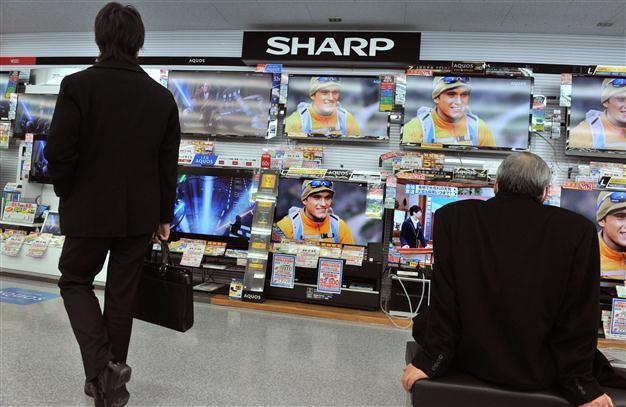Japan's Sharp forecasts $3.8 billion loss
TOKYO - Agence France-Presse

Customers watch on televisions under a Sharp logo at an electrical shop in Tokyo on February 1, 2012. AFP photo
Japanese electronics maker Sharp said Wednesday it expected a full-year net loss of $3.8 billion, blaming falling prices, a high yen and the global economic slowdown.The firm expects to lose 290 billion yen for the year to March, reversing an earlier projection of a six billion yen net profit.
For the nine months to December it made a net loss of 213.5 billion yen, compared with a 21.83 billion yen profit in the corresponding period in the previous year, it said.
During the same period, operating losses came to 9.1 billion yen, reversing operating profit of 66.5 billion yen in the previous year, while sales fell 18.3 percent to 1.9 trillion yen, Sharp said.
"Major price falls of products and devices such as LCD colour televisions and solar batteries as well as a dramatic increase of the yen" resulted in the lower revenues, the company said in a statement.
Sharp's predicament is shared by its rivals, most of which have failed to make profits by making televisions due to intensifying competition forcing manufacturers to cut prices to gain an edge.
Sharp booked an extraordinary item of 80.9 billion yen for structural reforms and losses related to the suspension of a large LCD plant in Japan after the devastating earthquake and tsunami in March.
It also booked corporate tax and other expenses of 115.2 billion yen after revaluing deferred tax assets on its books.
For the year to March, the company expects only to break even at the operating level, compared with an earlier forecast of an 85 billion yen profit.
It lowered its sales estimate by 8.9 percent to 2.55 trillion yen from 2.80 trillion yen.
Sony, Toshiba and Panasonic, among other major makers, have also bled red ink by making televisions, as unit prices have steadily fallen amid tough competition from foreign rivals such as Samsung.
Hitachi has decided to stop making televisions on its own later this year and outsource to foreign manufacturers.
Japanese firms were also hit hard by sluggish TV demand at home, after record sales last fiscal year due to a temporary subsidy as the country shifted to digital terrestrial broadcasting from an analogue system.
















